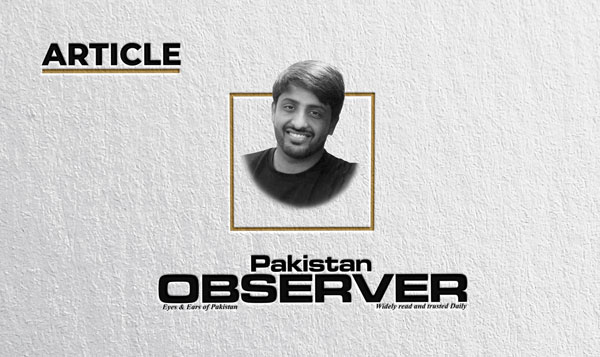Legacy of General Bajwa
EVER since Pakistan’s inception in 1947, Pakistan has had a formidable Army being commanded by none other than the best of the best.
And what stands as a fact is the noteworthy story of the 16th Army Chief of Pakistan — General Qamar Javed Bajwa.
Born on Nov 11th 1960, Gen Bajwa was commissioned into the Pakistan Army through PMA 62nd Long Course.
From the modest upbringing of Gakhar Mandi and Rawalpindi to being listed among the world’s most powerful people.
He is truly a man whose legacy is worth noting. His ideology is widely acclaimed and has served as a blueprint for his vision of Pakistan.
The Royal United Services Institute named it as “Bajwa Doctrine ‘’, which is rigorously built upon commitment towards a democratic future, capable institutions and a strong constitution.
It was his visionary conceptualization that a formerly atoned institution like the military evolved to become mediator and a proponent of democracy.
He has always acted towards stabilizing civilian governments instead of destabilizing them. This neutral stance maintained by him is proof of his responsible attitude towards democracy and politics.
Even with an all-out populist narrative building against him, he has always reiterated nothing but extreme confidence towards the ultimate strength of democratic institutions, as being confirmed just recently by DG ISPR in the wake of rumors about Gen Bajwa seeking a third extension into his role as COAS.
But no matter how much moot, General Bajwa being a patriot – expanded the military diplomacy of Pakistan Army and played a key role in enhancing the geopolitical profile of it manifold.
The institution under his expertise played a crucial role in strengthening Pakistan’s ties with countries across the globe through military diplomacy.
With military exercises being carried out with key international players such as China, Saudi Arabia, Russia and the UK.
His over-the-top measures at elevating the country out of economic challenges in support of the civilian government is an example like no other.
In the 75 years of Pakistan’s existence, it was the first time that the military’s top ledge accepted the defence budget cuts in 2019 as Pakistan faced economic woes and difficulties.
The institution’s increasing focus on stabilizing the economy under his able command demonstrated a realization towards the recognition of economic stability and hence making comprehensive sovereignty and security more achievable.
His efforts on rendering CPEC to lend a huge economic buffer to Pakistan. This was all possible due to General Bajwa’s personal efforts of bringing the parties to a consensus for an economic revolution.
Taking an interest in the settlement of complex disputes, General Bajwa saved the country billions of dollars.
His personal insight in the resolution of the Karkey dispute saved Pakistan from the 1.2 billion dollars penalty imposed by ICSID.
It was also his intelligent scheme that Pakistan made an unprecedented improvement in FATF action plans.
He set a bridge between both the civilian and military leadership and enacted a cooperation to get Pakistan out of the FATF grey-list.
It was Gen Bajwa’s insight that all the targets being given in FATF were completed before the stipulated time owing to his personal interest and continuous endeavours.
As the COAS, General Bajwa ordered the beginning of Operation “Radd-ul-Fasaad” (RuF) as part of NAP or the National Action Plan.
The operation’s name translates into the eradication of conflict. To fight the lingering threat of terrorism, intelligence-based operations were carried out along with the military operations.
Hence improving the security situation and providing stability to the country. Resultantly, the operation fetched the completion of the fencing along the Afghan border.
Due to this fencing, Pakistan has been able to suppress the potentially multitude of militant attacks from Afghanistan after the withdrawal of the US troops from the country last year.
Along with his national level interventions, General Bajwa’s regime actively pursued international platforms as well, be it the neighbor relations or the representation or the earned respect in the global arena- General Bajwa has been a sign of pride for the nation.
The COAS conjoined with the political leadership, rigorously backed the Afghan peace process and supported the US in extracting its forces.
Bringing the two parties to the negotiating table, aided the United States in withdrawing its troops from Afghanistan.
He maintained notable ties with all the neighbouring countries, especially with China. Impressed by his geo-economic and geo-political vision, China’s President invited the COAS.
China’s foreign ministry spokesperson Geng Shuang on the eve of second time extension stated complete faith and trust as the chief.
One of the Bajwa’s biggest achievements has been to push better ties with India. He initiated talks with India and negotiated a ceasefire agreement on the Line of Control that forms the de facto border with India.
The restoration of the ceasefire agreement has often been depicted in Pakistan as “General Bajwa’s Musharraf moment”.
Where there is cynicism, there is another side of the story always prevailing which needs to be addressed and appraised.
General Bajwa is a patriot who left no stone unturned for the stability, security and prosperity of Pakistan.
His legacy would be a setting stone for a more pro democratic, responsible role of the military, lending a deeper cooperation to the civilian and military establishment.
—The Islamabad-based writer is expert in Indian political affairs.










